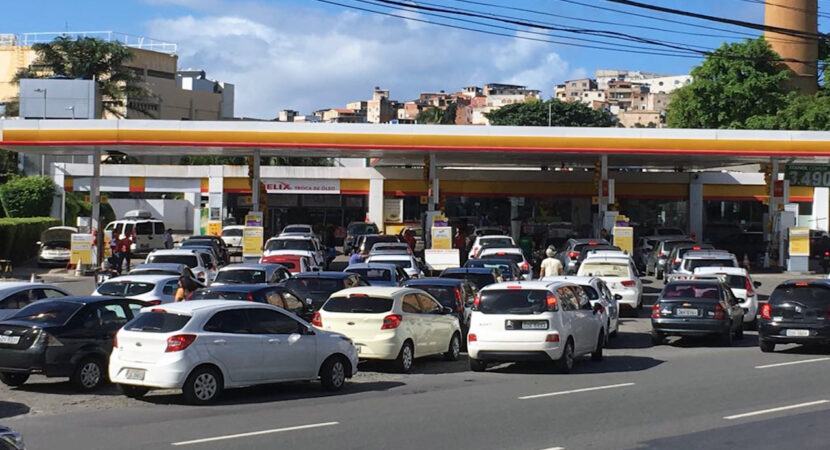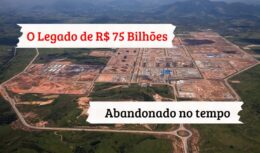
A project to contain the increase in fuel prices should be on the agenda of the Plenary in February and promises to lower the price of gasoline and diesel by up to R$ 3,00. Measure will relieve the pocket of the consumer
Prices per liter of gasoline and diesel can plummet to R$ 4,00! Starting in February, the Senate is expected to discuss a solution to contain the surge in fuel prices, which are currently experiencing constant spikes. Senate President Rodrigo Pacheco announced on January 17 that he will submit Bill 1.472/2021 to the college of leaders, which creates a program to stabilize the price of oil and derivatives in Brazil. If the leaders agree, the project will be on the agenda of the Plenary.
Read also
- Brazil, the world's leading ethanol producer, will profit from India's new fuel policy, which calls for adding 20% of the biofuel to gasoline from 2023
- After a new increase in the price of gasoline and diesel by Petrobras, state secretaries decide to end the ICMS freeze on fuel and the consumer has nowhere to run
- The rise in the price of Petrobras' fuel does not prevent Repar from breaking a monthly gasoline sales record in Paraná and Santa Catarina; state-owned refinery delivered 3,7 million m³ of product to distributors
- After 77 days without increases, Petrobras is under pressure to increase the price of gasoline and diesel starting tomorrow (12/01) to ensure that the market continues to be supplied on an economic basis and without risk of shortages
“I will submit it for evaluation by the College of Leaders at the beginning of February. The intention is to guide. Senator Jean Paul Prates will be the rapporteur and is dedicating himself a lot to the subject”, informed Pacheco.
The impact of this subsidy package could lead to a reduction of up to R$3 in diesel and gasoline, and up to R$20 in a 13kg gas cylinder in a period of up to 40 days, from the approval of the Executive branch or of the President of the Republic.
A “compensation account” should be created with funds from profits obtained by the government with the “exceptional rise in the dollar and oil”, in order to guarantee the international price for the refiner and the importer
O 1.472 PL / 2021, by Senator Rogerio Carvalho (PT-SE), was approved by the Economic Affairs Commission (CAE) in December 2021, and contains measures to cushion the impacts of increases in the price of a barrel of oil and contain the rise in fuel prices. The project was approved in the form of a substitute (alternative text) by Senator Jean Paul Prates (PT-RN).
The text, according to Jean Paul, is based on three pillars: in addition to creating a stabilization program, with the aim of reducing the volatility of oil product prices, it creates a new internal price policy for sales to distributors and companies that sell petroleum products produced in Brazil.
In addition, it presents a set of possible sources of funds to avoid recurring readjustments at the fuel pump and in the sale of gas to consumers. Among these sources is an export tax on crude oil, the main issue of disagreement between senators. Under the proposal, the revenue from this charge will be used to subsidize price stabilization when product values rise.
Last week, Petrobras raised the prices of gasoline (4,85%) and diesel (8,08%) for distributors
Fuel prices underwent successive readjustments in 2021, which resulted in an increase in service stations of around 44%. Last week, Petrobras raised the prices of gasoline (4,85%) and diesel (8,08%) for distributors, which caused concern among senators. The rise in fuel prices has impacted the inflation rate, which was over 10% in 2021.
In the substitute approved by the CAE, the rates of incidence of the Export Tax on crude oil are changed. The approved project establishes minimum and maximum rates for the tax, which will vary according to the price of the product and in some situations will be zeroed as a way to subsidize stabilization.
Under the substitute, the rate will be a minimum of 2,5% and a maximum of 7,5%, applied only to the portion of the value of crude oil between US$ 45 and US$ 85 per barrel. The rate changes to a minimum of 7,5% and a maximum of 12,5% when applied to the portion of the value of crude oil above US$ 85 per barrel and below or equal to US$ 100 per barrel. For installments above US$ 100 per barrel, the rate will be at least 12,5% and at most 20%.
According to the rapporteur, the tax is just one of the tools that the government will have to ensure that barrel increases in the international market do not impact the budget of families and the entire economy so frequently.
Other sources of funds and instruments that can be used as a price “cushion”, at the government's discretion, are: Petrobras' dividends owed to the Union; government holdings for the Union resulting from the oil concession and sharing regime; positive result verified in the balance sheet of the Central Bank of foreign exchange reserves; and income from financial surplus from free investment sources available in the Union's balance sheet.
Another Project under review in the Senate wants to prohibit the linking of the values of fuels derived from petroleum to the values of the dollar and Brent quotations in the international market
Another project is under analysis in the Senate, PL 3.450/2021, by Senator Jader Barbalho (MDB-PA). Text presented in October prohibits linking the prices of petroleum-derived fuels to the prices of the dollar and the barrel of oil on the international market.
For the senator, the US currency has a direct impact on the price of fuel because, since 2016, Petrobras has used the value of a barrel of oil in dollars to make adjustments to domestic gasoline. “That is, when the dollar is high, the price of a barrel of oil also rises, directly impacting the price of Brazilian fuel”, explained Jader Barbalho.
– Senate Agency













The potential of this research and…
There is already a language translation app…
Developed countries now need a helping hand…
I've never seen a website publish so much zucchini...
It must be sold to the Australians, nation…
Much better than playing a lot…
Very interesting, but there is so much invasive propaganda…
I would love to, but being released here the vlr would be…